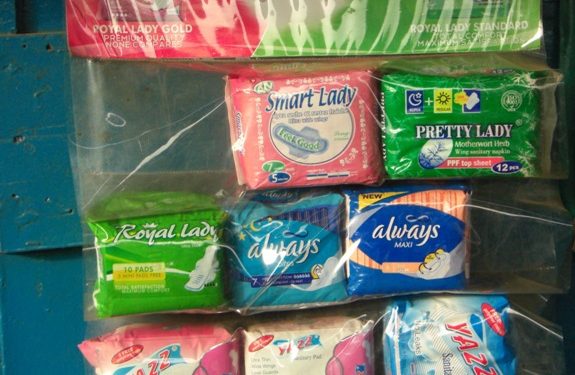Sanitary pads are considered a luxury item by the Ghana Revenue Authority and thus, they attract an import tax of 20%.
In a country that heavily depends on the economic participation of women, high prices of sanitary pads do not only widen the gender gap but prevent women from productively contributing to the development of the nation.
The expensive price of sanitary pads has forced some women to adopt unconventional methods like substituting diapers for sanitary pads.
Hajia, a store owner at Nima, shares why her customers prefer diapers to sanitary pads.
“These days, women prefer diapers. We sell them individually, so they are more affordable than the pads. They can’t afford the GHS7 or GHS5 pads. With GHS1, they can get diapers.”
“Maybe the person does not have the money, they can’t afford to buy pads for GHS6. But, if they get GHS1 or 80 pesewas, they can buy a diaper. By evening, they may have made 80 pesewas to buy another one. With 70 or even 50 pesewas, they can buy diapers. Most people are willing to spend GHS3 on pads. With the diapers, they only need four, which will cost them just GHS2.50. Compare that to the GHS7 pads. You save more using the diapers.”
Although not advisable to keep sanitary pads on for more than four hours, women like Aisha Abubakar, find it more cost-efficient to use one diaper for more than 8 hours than the sanitary pads.
“When I wear the pad, it gets full quickly, and I have to change it. It is also very expensive, so that isn’t economical. That’s why I wear diapers. They are cheap and last longer than the pads. The pads get full too fast and I don’t have the money to sustain them.”
The NPP administration, in its 2020 manifesto, promised to remove the 20% import tax on sanitary pads after intense advocacy by women’s rights groups.
Unfortunately, this commitment was surprisingly not captured in the 2021 budget.
For women like Martha, diapers are the only option. “I used to wear pads, but my friend suggested I use the diapers, so I tried them, and they worked for me.”
What do you like about it?
“If I wear it at 6:00 am, I won’t have to take it off till evening. When I wear sanitary pads, I have to change them three times a day. The sanitary pads are too expensive. The diapers help us more than the sanitary pads.”
Geoffrey Ocansay, Executive Director, Revenue Generation Africa, believes the solution to lending period poverty lies in providing subsidized sanitary pads for women in low-income neighbourhoods.
“The government should clear all taxes on sanitary pads. Beyond this, government must also subsidize the sanitary pads for those who are very poor.”
Source: citibusinessnews.com





